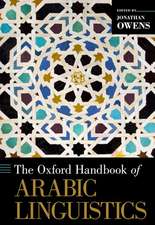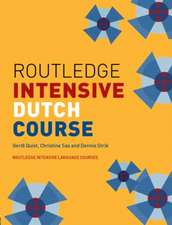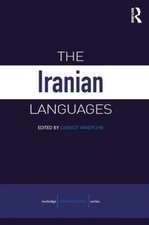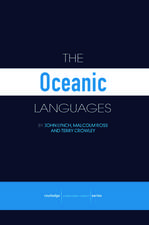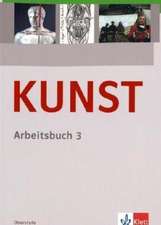Information Structure in Spoken Arabic: Routledge Arabic Linguistics Series
Editat de Jonathan Owens, Alaa Elgibalien Limba Engleză Paperback – 15 feb 2013
This is the first book to provide an in-depth analysis of information structure in spoken Arabic, which is based on language as it is actually used, not on normatively-given grammar. Written by leading experts in Arabic linguistics, the studies evaluate the ways in which relevant parts of a message in spoken Arabic are encoded, highlighted or obscured. It covers a broad range of issues from across the Arabic-speaking world, including the discourse-sensitive properties of word order variation, the use of intonation for information focussing, the differential role of native Arabic and second languages to encode information in a codeswitching context, and the need for cultural contextualization to understand the role of "disinformation" structure.
The studies combine a strong empirical basis with methodological and theoretical issues drawn from a number of different perspectives including pragmatic theory, language contact, instrumental prosodic analysis and (de-)grammaticalization theory. The introductory chapter embeds the project within the deeper Arabic grammatical tradition, as elaborated by the eleventh century grammarian Abdul Qahir al-Jurjani. This book provides an invaluable comprehensive introduction to an important, yet understudied, component of spoken Arabic.
| Toate formatele și edițiile | Preț | Express |
|---|---|---|
| Paperback (1) | 419.50 lei 6-8 săpt. | |
| Taylor & Francis – 15 feb 2013 | 419.50 lei 6-8 săpt. | |
| Hardback (1) | 1058.65 lei 6-8 săpt. | |
| Taylor & Francis – 22 iul 2009 | 1058.65 lei 6-8 săpt. |
Preț: 419.50 lei
Nou
Puncte Express: 629
Preț estimativ în valută:
80.30€ • 87.25$ • 67.49£
80.30€ • 87.25$ • 67.49£
Carte tipărită la comandă
Livrare economică 21 aprilie-05 mai
Preluare comenzi: 021 569.72.76
Specificații
ISBN-13: 9780415845113
ISBN-10: 0415845114
Pagini: 288
Ilustrații: 17 black & white illustrations, 36 black & white tables, 17 black & white line drawings
Dimensiuni: 156 x 234 mm
Greutate: 0.41 kg
Ediția:1
Editura: Taylor & Francis
Colecția Routledge
Seria Routledge Arabic Linguistics Series
Locul publicării:Oxford, United Kingdom
ISBN-10: 0415845114
Pagini: 288
Ilustrații: 17 black & white illustrations, 36 black & white tables, 17 black & white line drawings
Dimensiuni: 156 x 234 mm
Greutate: 0.41 kg
Ediția:1
Editura: Taylor & Francis
Colecția Routledge
Seria Routledge Arabic Linguistics Series
Locul publicării:Oxford, United Kingdom
Public țintă
Postgraduate, Professional, and UndergraduateCuprins
1. Explaining Null and Overt Subjects in Spoken Arabic 2. Word Order and Textual Function in Gulf Arabic 3. Information Structure in the Najdi Dialects 4. Word Order in Egyptian Arabic: Form and Function 5. The Information Structure of Existential Sentences in Egyptian Arabic 6. The Pragmatics of Information Structure in Arabic: Colloquial Tautological Expressions as a Paradigm Example 7. From Complementizer to Discourse Marker: The Functions of ’inno in Lebanese Arabic 8. The (Absence of) Prosodic Reflexes of Given/New Information Status in Egyptian Arabic 9. Moroccan Arabic—French Codeswitching and Information Structure 10. Conversation Markers in Arabic—Hausa Codeswitching: Saliency and Language Hierarchies 11. Understatement, Euphemism, and Circumlocution in Egyptian Arabic: Cooperation in Conversational Dissembling
Recenzii
"By and large, the studies in this ground-breaking volume have opened a new vista on the significant subject of information structure, and will be of immense value to all students of Arabic and comparative linguistics who are interested in intercultural interaction of pragmatic ideas in modern linguistic scholarship." - Amidu Olalekan Sanni, Lagos; Zeitschrift fuer Arabische Linguistik (Journal of Arabic Linguistics), 57, 2013, pp. 91-94 (2013).
Descriere
Spoken Arabic is different in many respects from literary Arabic. This book is concerned with speakers’ intentions and the structural and pragmatic resources they employ. Based on new empirical findings from across the Arabic world this work will be of interest to both students and researchers.










